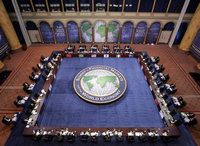As an IMF note to the G-20 leaders gathered at the recent London summit put it, "Growth also plunged across a broad swath of emerging economies. Against this backdrop, global activity is expected to contract in 2009 for the first time in 60 years." In 1998, the Asian financial crisis left a lasting mark on politics in Southeast Asia. The Suharto regime fell in Indonesia and, arguably, ongoing turmoil in Malaysia and Thailand can be traced to the impact of '98. However, this time around, the region is expected to come through the current recession relatively unscathed, in comparison with a decade ago, and in comparison with Eastern Europe, another market-oriented emerging-economy locus.
Regional Emerging-Economy Hotbeds Weather Economic Storm

